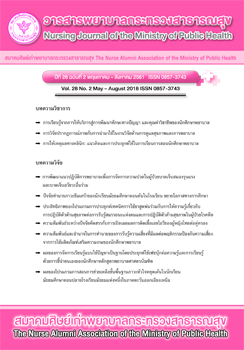Predicting Factors of Depression among Secondary School Students in Extended Educational Opportunity Schools
Main Article Content
Abstract
Abstract
The purpose of this predictive correlational study was to investigate the prevalence of depression and its redicting factors among 350 secondary school students studying in extended educational opportunity schools which located in Muang District, Chon Buri Province. The stratified random sampling was employed to select the sample. Instruments used for data collection included 1) Demographic Data, 2) Children’s Depression Inventory-CDI, 3) Resilience Inventory, 4) Life Asset Inventory, 5) Family Relationship Questionnaires, 6) Friendship Intimacy Questionnaire and 7) Personal Resource Questionnaire. The questionnaires part 2-7 yielded Cronbach’s Alpha of .84-.95. Descriptive statistics, Pearson’s product moment correlation coefficient, and stepwise multiple regression analysis were
employed for data analyses.
The study findings revealed that this sample had a mean depression score of 11.27 (SD=8.92), 27.27 percent of this sample had depression (CDI ≥ 15). Stepwise multiple regression analysis demonstrated that life asset, family relationship, and social support together could significantly explained 21.00 % of the variance for depression (R2=.210, F=29.340, p<.001). The influence of significant predicting factors ordered from high to low were life asset (β=-.292, p<.05), family relationship (β=-.157, p<.05) and social support (β=-.112, p<.05).
The study results demonstrated that students from extended educational opportunity schools are a high risk group for depression. This should be a prime concern for healthcare providers and academic administrators. Mental health services aimed at enhancing life assets, family relationships and social support should be promoted to these students.
Article Details
บทความและรายงานวิจัยในวารสารพยาบาลกระทรวงสาธารณสุข เป็นความคิดเห็นของ ผู้เขียน มิใช่ของคณะผู้จัดทำ และมิใช่ความรับผิดชอบของสมาคมศิษย์เก่าพยาบาลกระทรวงสาธารณสุข ซึ่งสามารถนำไปอ้างอิงได้
References
1. Tuklang S. Thongtang O. Satra, T. Phattha rayuttawat S. Factors influencing depression among early adolescents in extended educational opportunity school of Samutsakhon Province. Journal of Psychiatric Association Thailand 2012;57(3):283-94.
2. Singthong R. The relationships among coping behavior, life satisfaction, social support and depression of junior high school students in opportunity expansion schools, district of muang, Surat Thani Province. Bangkok: Silpakorn University;2002. (in Thai).
3. Kaewkungwan S. Developmental psychology. Bangkok: Thammasat University; 2010. (in Thai).
4. Beck AT. Alford BA. Depression: clinical, experimental, and theoretical aspects (2nded.). Pennsylvania: University of Pennsylvania Press; 2009.
5. Gladstone TR. Beardslee WR. O’Connor EE. The Prevention of Adolescent Depression. Psychiatric Clinic of North America 2011, 34, (1):35–52.
6. Rudolph KD. The interpersonal context of adolescent depression. In S. Nolen-Hoeksema & L. M. Hilt (Eds.), Handbook of depression in adolescents (pp. 376-418). New York: Routledge.2012.
7. Nintachan P. Vanaleesin S. Sanseeha L. Thummathai K. Orathai P. Resilience and Thai youth risk behavior. Ramathibodi Nursing Journal 2011;17(3):430-43.
8. Tripathi S. Sungthong P. Salajun S. The National survey of life assets (positive youth development) of secondary school students in Thailand. Thai Journal of Pediatrics 2013;36-43.
9. Veerakalus O. Wongkumsin T. Life’s assets, social skill, optimism and sense of coherence of male youth probationers of probation offices in Bangkok. Journal of Social Science & Humanity 2012;38(2):179-95.
10. Resnick MD. Beatman PS. Blum RW. Bauman KE. Harris KM. Jones J. Tabor J. Beuhring T. Sieving RE. Shew M. Ireland M. Bearinger LH. Udry JR. Protecting adolescents from harm: findings from the National longitudinal study on adolescent health. JAMA 1997;278(10):823-32.
11. Sanchai P. The relationship between family connectedness, self- esteem and coping strategies of adolescents in Samut prakan province. Bangkok: Ramkhamhaeng University; 2011. (in Thai)
12. Sangsanai S. The effecs of interpersonal relationship on depression among Thai adolescents. Chonburi: Burapha university;2017.(in Thai)
13. Brandt PA. Weinert C. PRQ: Psychometric update. Washington D.C: University of Washington; 1985.

